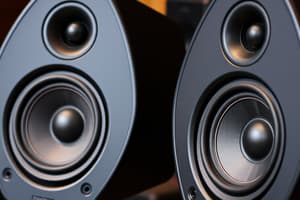Podcast
Questions and Answers
What is the primary focus of audio post-production?
What is the primary focus of audio post-production?
- Recording audio for music albums
- Mixing audio for podcasts
- Crafting audio synchronized with moving pictures (correct)
- Creating sound effects for live events
Production audio refers to the audio recorded after filming.
Production audio refers to the audio recorded after filming.
False (B)
Besides television and film, name another type of media where post-production might be used.
Besides television and film, name another type of media where post-production might be used.
web-based media
The process of making a television show or movie starts with the filming and on-site recording of the actors and performers, this is collectively known as the ______ phase.
The process of making a television show or movie starts with the filming and on-site recording of the actors and performers, this is collectively known as the ______ phase.
Which of the following is NOT typically a part of audio post-production?
Which of the following is NOT typically a part of audio post-production?
Audio post production techniques are not applicable to audiobooks.
Audio post production techniques are not applicable to audiobooks.
What are the two main categories of post-production that are mentioned in the text?
What are the two main categories of post-production that are mentioned in the text?
Match the media production phase with its description:
Match the media production phase with its description:
What happens when you click 'Clear' in the Clip Effects section?
What happens when you click 'Clear' in the Clip Effects section?
The 'Render' option in Clip Effects creates new audio files with the applied effects.
The 'Render' option in Clip Effects creates new audio files with the applied effects.
What key do you hold to save a Clip Effect preset by clicking on a memory button?
What key do you hold to save a Clip Effect preset by clicking on a memory button?
Clip Effect settings can be managed through the ______ menu.
Clip Effect settings can be managed through the ______ menu.
In Pro Tools Preferences, the 1-5 number keys can be set to control which presets?
In Pro Tools Preferences, the 1-5 number keys can be set to control which presets?
You need to have the Clip Effects window enabled to apply Clip Effects presets using the 1-5 number keys.
You need to have the Clip Effects window enabled to apply Clip Effects presets using the 1-5 number keys.
Besides using preset buttons, how else can you quickly recall Clip Effects presets?
Besides using preset buttons, how else can you quickly recall Clip Effects presets?
Match the actions with their corresponding results:
Match the actions with their corresponding results:
Which organization developed the timecode standard used in video and film production?
Which organization developed the timecode standard used in video and film production?
The most common timecode format displays hours, minutes, seconds, and milliseconds.
The most common timecode format displays hours, minutes, seconds, and milliseconds.
What is the frame rate commonly used for film production?
What is the frame rate commonly used for film production?
A frame rate of 29.97 fps is commonly used for ___ video.
A frame rate of 29.97 fps is commonly used for ___ video.
What is the primary purpose of drop frame rates?
What is the primary purpose of drop frame rates?
When using drop frame rates, actual frames of video are skipped.
When using drop frame rates, actual frames of video are skipped.
Which setting determines the frame rate of your Pro Tools session?
Which setting determines the frame rate of your Pro Tools session?
The Timecode 2 Rate pop-up menu affects only the ___ ruler.
The Timecode 2 Rate pop-up menu affects only the ___ ruler.
Which version of Pro Tools does NOT support video tracks?
Which version of Pro Tools does NOT support video tracks?
Pro Tools Ultimate can support up to 128 video tracks.
Pro Tools Ultimate can support up to 128 video tracks.
What is the primary function of a Sync Point in clip editing?
What is the primary function of a Sync Point in clip editing?
What does AVE stand for?
What does AVE stand for?
A single clip can have multiple sync points.
A single clip can have multiple sync points.
What tool is used to move a sync point after it has been created?
What tool is used to move a sync point after it has been created?
The Avid Video Engine is automatically activated when you ___ video into a session.
The Avid Video Engine is automatically activated when you ___ video into a session.
Match the following frame rates with their common uses:
Match the following frame rates with their common uses:
To remove a sync point, hold ______ and click on the sync point.
To remove a sync point, hold ______ and click on the sync point.
Match the following terms with their descriptions:
Match the following terms with their descriptions:
What is the primary function of the Avid Video Engine in Pro Tools?
What is the primary function of the Avid Video Engine in Pro Tools?
Which of the following is NOT a benefit of using Clip Effects?
Which of the following is NOT a benefit of using Clip Effects?
It is recommended to keep the Avid Video Engine active even when not using video in the session
It is recommended to keep the Avid Video Engine active even when not using video in the session
Clip Effects are limited to post-production workflows only.
Clip Effects are limited to post-production workflows only.
What type of audio processing do Clip Effects most closely resemble?
What type of audio processing do Clip Effects most closely resemble?
The Clip Effects view includes EQ, filters, and a ______ section.
The Clip Effects view includes EQ, filters, and a ______ section.
Match the following icons with the processing they represent in the context of Clip Effects:
Match the following icons with the processing they represent in the context of Clip Effects:
How can you show or hide the Clip Effects view?
How can you show or hide the Clip Effects view?
Changes made with Clip Effects are automated.
Changes made with Clip Effects are automated.
When you disable a section of Clip Effects, what happens to the settings?
When you disable a section of Clip Effects, what happens to the settings?
By right-clicking a clip, you can access a menu that allows you to manage the clip effects, including an option to ______ to temporarily pause their effects
By right-clicking a clip, you can access a menu that allows you to manage the clip effects, including an option to ______ to temporarily pause their effects
Match the descriptions with the method for managing effected clips:
Match the descriptions with the method for managing effected clips:
What is the least CPU-intensive size setting for the Video window in Pro Tools?
What is the least CPU-intensive size setting for the Video window in Pro Tools?
In Pro Tools Studio, you can edit multiple video clips on separate tracks.
In Pro Tools Studio, you can edit multiple video clips on separate tracks.
What is the primary purpose of Spot mode when dealing with video clips in Pro Tools?
What is the primary purpose of Spot mode when dealing with video clips in Pro Tools?
When using Spot mode, the desired location for the beginning of the clip is entered in the ______ field.
When using Spot mode, the desired location for the beginning of the clip is entered in the ______ field.
Match the following edit modes with their descriptions:
Match the following edit modes with their descriptions:
Which key is primarily used (on Mac) along with the Grabber tool to snap the beginning of a clip to the Edit cursor?
Which key is primarily used (on Mac) along with the Grabber tool to snap the beginning of a clip to the Edit cursor?
Resizing the Video window to a smaller size does not require additional processing power.
Resizing the Video window to a smaller size does not require additional processing power.
What is the significance of the position of the video on the session's timeline?
What is the significance of the position of the video on the session's timeline?
The ability to move the video clip depends on the _____ mode that you're using.
The ability to move the video clip depends on the _____ mode that you're using.
What is required to snap the end of a clip to the Edit cursor on a Mac?
What is required to snap the end of a clip to the Edit cursor on a Mac?
Spotting sessions are where producers view the video and determine the positions of sounds.
Spotting sessions are where producers view the video and determine the positions of sounds.
What tool is typically used when moving clips to snap them to the Edit cursor?
What tool is typically used when moving clips to snap them to the Edit cursor?
When moving a clip from the clips list to snap the start to the edit cursor, you must hold either the control key (mac) or the ____ key (windows)
When moving a clip from the clips list to snap the start to the edit cursor, you must hold either the control key (mac) or the ____ key (windows)
When linking the timeline and edit selection, and nudging to a specific point, what is the ideal nudge value?
When linking the timeline and edit selection, and nudging to a specific point, what is the ideal nudge value?
Match the editing action to the keys pressed on a Windows computer using the grabber tool.
Match the editing action to the keys pressed on a Windows computer using the grabber tool.
In Pro Tools, how can you import a video file?
In Pro Tools, how can you import a video file?
Pro Tools Studio supports multiple video files in a session.
Pro Tools Studio supports multiple video files in a session.
What are the two track views available for video tracks in Pro Tools?
What are the two track views available for video tracks in Pro Tools?
If the Video Engine Rate text is colored red, it indicates that the video frame rate doesn't match the session frame rate in the Session Setup dialog box. The usual remedy is to change the session settings to match the video file's _______.
If the Video Engine Rate text is colored red, it indicates that the video frame rate doesn't match the session frame rate in the Session Setup dialog box. The usual remedy is to change the session settings to match the video file's _______.
Which of the following file types are supported for video import in Pro Tools?
Which of the following file types are supported for video import in Pro Tools?
When importing a video file, Pro Tools will copy the file to the session’s Audio Files subfolder.
When importing a video file, Pro Tools will copy the file to the session’s Audio Files subfolder.
What is the purpose of the 'Video Engine Rate' indicator on a video track?
What is the purpose of the 'Video Engine Rate' indicator on a video track?
In Blocks view, the video clip is represented as a colored ______, and does not provide visual feedback.
In Blocks view, the video clip is represented as a colored ______, and does not provide visual feedback.
What is the function of the 'Select video playback quality' menu in the I/O column of a video track?
What is the function of the 'Select video playback quality' menu in the I/O column of a video track?
The Video window always remains on top of the Edit and Mix windows in Pro Tools.
The Video window always remains on top of the Edit and Mix windows in Pro Tools.
What keyboard shortcut can be used to show/hide the Video Window?
What keyboard shortcut can be used to show/hide the Video Window?
When resizing the Video window in Pro Tools, the ______ ratio of the video is not changed.
When resizing the Video window in Pro Tools, the ______ ratio of the video is not changed.
Match the video track view with its description:
Match the video track view with its description:
What will happen if you import a new video file into a Pro Tools Studio session that already has a video file?
What will happen if you import a new video file into a Pro Tools Studio session that already has a video file?
In the Video window, you can change the aspect ratio of the video by selecting from 'Stretch and Pillarbox/Letterbox' options.
In the Video window, you can change the aspect ratio of the video by selecting from 'Stretch and Pillarbox/Letterbox' options.
Flashcards
Audio Post-Production
Audio Post-Production
The process of adding, editing, and mixing sound for visual media such as television and movies, often done after filming and basic video editing.
Production Audio
Production Audio
Audio recorded during the filming of a television show or movie, representing the original sound.
Post-Production
Post-Production
The stage of filmmaking and television production that occurs after filming and initial editing, where elements such as visual effects, sound design, and music are added to create the final product.
Video Frame Rate
Video Frame Rate
Signup and view all the flashcards
Conforming Clips
Conforming Clips
Signup and view all the flashcards
Clip Effects
Clip Effects
Signup and view all the flashcards
Digital Audio Workstation (DAW)
Digital Audio Workstation (DAW)
Signup and view all the flashcards
Audio Post-Production Engineer
Audio Post-Production Engineer
Signup and view all the flashcards
Importing a Video File
Importing a Video File
Signup and view all the flashcards
Video File Types
Video File Types
Signup and view all the flashcards
Video Import Options
Video Import Options
Signup and view all the flashcards
Import Audio from File
Import Audio from File
Signup and view all the flashcards
Audio Files Subfolder
Audio Files Subfolder
Signup and view all the flashcards
Video Track
Video Track
Signup and view all the flashcards
Video Track Views
Video Track Views
Signup and view all the flashcards
Blocks View
Blocks View
Signup and view all the flashcards
Frames View
Frames View
Signup and view all the flashcards
Video Engine Rate
Video Engine Rate
Signup and view all the flashcards
Red Text in Video Engine Rate
Red Text in Video Engine Rate
Signup and view all the flashcards
Select Video Playback Quality Menu
Select Video Playback Quality Menu
Signup and view all the flashcards
Video Window
Video Window
Signup and view all the flashcards
Video Window Visibility Control
Video Window Visibility Control
Signup and view all the flashcards
Video Window Resizing
Video Window Resizing
Signup and view all the flashcards
Frame Rate
Frame Rate
Signup and view all the flashcards
SMPTE Timecode
SMPTE Timecode
Signup and view all the flashcards
23.976 fps
23.976 fps
Signup and view all the flashcards
24 fps
24 fps
Signup and view all the flashcards
25 fps
25 fps
Signup and view all the flashcards
29.97 fps
29.97 fps
Signup and view all the flashcards
30 fps
30 fps
Signup and view all the flashcards
Drop Frame Rates
Drop Frame Rates
Signup and view all the flashcards
Timecode 2 Rate
Timecode 2 Rate
Signup and view all the flashcards
Avid Video Engine (AVE)
Avid Video Engine (AVE)
Signup and view all the flashcards
Importing Video
Importing Video
Signup and view all the flashcards
Pro Tools version that supports limited video editing.
Pro Tools version that supports limited video editing.
Signup and view all the flashcards
Professional video editing software that offers more robust features.
Professional video editing software that offers more robust features.
Signup and view all the flashcards
Session Setup
Session Setup
Signup and view all the flashcards
Clip Effects Presets
Clip Effects Presets
Signup and view all the flashcards
Clip Effects Librarian
Clip Effects Librarian
Signup and view all the flashcards
Render Clip Effects
Render Clip Effects
Signup and view all the flashcards
Number Keys Control
Number Keys Control
Signup and view all the flashcards
Paste Clip Effects
Paste Clip Effects
Signup and view all the flashcards
Clear Clip Effects
Clear Clip Effects
Signup and view all the flashcards
Apply Clip Effects Preset
Apply Clip Effects Preset
Signup and view all the flashcards
Sync Point
Sync Point
Signup and view all the flashcards
Selector Tool
Selector Tool
Signup and view all the flashcards
Creating a Sync Point Shortcut
Creating a Sync Point Shortcut
Signup and view all the flashcards
Plosives
Plosives
Signup and view all the flashcards
Sibilance
Sibilance
Signup and view all the flashcards
Clip Effects View
Clip Effects View
Signup and view all the flashcards
Enabling/Disabling Clip Effects Sections
Enabling/Disabling Clip Effects Sections
Signup and view all the flashcards
Effected Clips
Effected Clips
Signup and view all the flashcards
Clip Effects Indicators
Clip Effects Indicators
Signup and view all the flashcards
Bypass Clip Effects
Bypass Clip Effects
Signup and view all the flashcards
Copy Clip Effects
Copy Clip Effects
Signup and view all the flashcards
Managing Clip Effects
Managing Clip Effects
Signup and view all the flashcards
Grabber Tool
Grabber Tool
Signup and view all the flashcards
Edit Cursor
Edit Cursor
Signup and view all the flashcards
Video Window Size
Video Window Size
Signup and view all the flashcards
Moving a Video Clip
Moving a Video Clip
Signup and view all the flashcards
Using SMPTE Timecode
Using SMPTE Timecode
Signup and view all the flashcards
Snapping the Start of a Clip
Snapping the Start of a Clip
Signup and view all the flashcards
Snapping the End of a Clip
Snapping the End of a Clip
Signup and view all the flashcards
Snapping a Sync Point
Snapping a Sync Point
Signup and view all the flashcards
Spotting Clips
Spotting Clips
Signup and view all the flashcards
Spot Mode
Spot Mode
Signup and view all the flashcards
Slip Mode
Slip Mode
Signup and view all the flashcards
Nudging
Nudging
Signup and view all the flashcards
Dragging From the Clips List
Dragging From the Clips List
Signup and view all the flashcards
Post-Production Audio Workflow
Post-Production Audio Workflow
Signup and view all the flashcards
Timeline
Timeline
Signup and view all the flashcards
Link Timeline and Edit Selection
Link Timeline and Edit Selection
Signup and view all the flashcards
Study Notes
Audio Post-Production
- Audio post-production is the process of crafting audio synchronized with visual media (e.g., TV, film, web).
- It follows the production phase (filming and initial editing).
- Post-production on audio involves additional recording, importing, editing, and mixing.
Frame Rates
- SMPTE timecode (Society of Motion Picture and Television Engineers) measures video time in hours, minutes, seconds, and frames.
- Frame rate is crucial for synchronizing audio and video, ensuring consistency across the production team.
- Common frame rates:
- 23.976 fps: Used in digital cinema, easily convertible to film or NTSC.
- 24 fps: Common in film production.
- 25 fps: Commonly used in PAL video.
- 29.97 fps: Common in NTSC video.
- 30 fps: Used in ATSC (Advanced Television Systems Committee) video and SMPTE synchronization in music production.
- "Drop" frame rates are technical compromises that skip (or drop) timecode frames while maintaining hours, minutes, and seconds.
- Different frame rates (drop vs. non-drop) should not be used simultaneously.
Pro Tools and Video Tracks
- Pro Tools Intro and Artist lack video track support.
- Pro Tools Studio supports a single video track.
- Pro Tools Ultimate supports multiple video tracks (up to 64), with limited video editing capabilities (cut, copy, paste, delete).
- Avid Video Engine (AVE) enables video playback in Pro Tools.
- Activate AVE in Playback Engine settings (Setup menu).
- Importing video into Studio directly imports the video file in its original location (vs. copying).
- Only one video track is supported in Pro Tools Studio (importing a new file replaces the existing one).
Video Tracks and Views
- Video tracks offer two views (Blocks and Frames).
- Blocks view shows video clips as blocks; lightweight but doesn't visualize the clip's content.
- Frames view shows clips as thumbnails; offers visual content but consumes more resources.
- Red "Video Engine Rate" indicates a frame rate mismatch between the video and session settings.
- The "Select video playback quality" menu in I/O column adjusts video output quality to conserve CPU resources.
Video Window
- The Video window shows video in the session; can be hidden or shown via the Window menu or keyboard shortcut (Command/Ctrl + 9).
- It can be resized, but not the aspect ratio of the video.
- Right-click to adjust size (including fullscreen), and change quality settings.
- Choose "Actual Size" if system resources are limited.
Video Editing
- Pro Tools Studio has a single video track which can be moved on the timeline, but not edited.
- SMPTE timecode is used in video positioning with Spot mode.
- Using Spot mode positions a clip by specifying its start position in SMPTE timecode.
Conforming Clips
- Aligning audio to video action is crucial in post-production via spotting sessions or Pro Tools manipulation.
- Snapping tools (Control/Start key modifier) precisely position clips on the timeline using the Edit cursor to align clips.
- Create Sync Points within a clip.
Clip Effects
- Clip Effects apply effects to individual clips on a track, without affecting other clips, improving efficiency.
- Similar in functionality to AudioSuite plug-ins but individually applied to clips.
- Show Clip Effects view in the Edit window (View menu, toolbar, or button).
- Effects include Input trim, phase inversion, EQ, Filters, and Dynamics.
- Clips Effects are managed via the Edit window.
- Applying effect can be bypassed, copied, cleared, or rendered to new files (to apply the Clip effect permanently instead of using it dynamically).
- Clip Effects presets can be stored and recalled.
- The Librarian menu offers presets and saving/recalling settings.
- Preferences control which keyboard numbers recall Clip Effects or zoom presets.
Studying That Suits You
Use AI to generate personalized quizzes and flashcards to suit your learning preferences.




